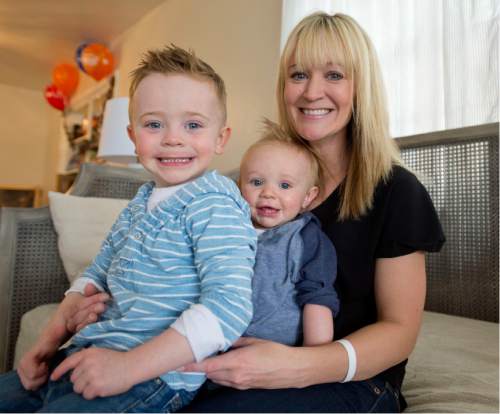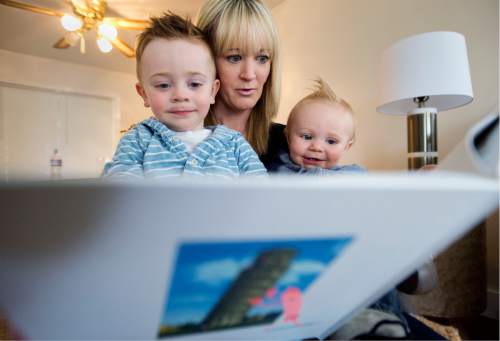This is an archived article that was published on sltrib.com in 2016, and information in the article may be outdated. It is provided only for personal research purposes and may not be reprinted.
Halie Hearty spoke softly into the telephone one Friday afternoon, careful not to wake her 11-month-old son, Rigg.
She had time to talk, she said, while Cache, her 3-year-old, bathed in the next room.
Hearty, 35, never thought she would be planning her day around two kids as she and her husband try for No. 3.
She had struggled to get pregnant since her late 20s and underwent a slew of tests to determine her ability to conceive, including having her egg supply measured at ARUP Laboratory in Salt Lake City.
That's determined by testing a woman's anti-mullerian hormone (AMH) levels, a newer marker of fertility. And it's become vital, specialists say, as more women put off pregnancy.
Women are born with a finite number of eggs, anywhere from 1 million to 2 million. One egg is released each month during the menstrual cycle while many others die every month.
Hearty's AMH level showed up virtually nonexistent.
The results prepared her for the harsh reality that kids might never happen.
"I remember looking at the ceiling and thinking, 'We may or we may not,' " Hearty said.
The test, which costs about $100, does not provide doctors the exact number of eggs a woman has left, but it allows them to determine if a woman's supply is running low, which could contribute to pregnancy struggles, said Joely Straseski, medical director of endocrinology at ARUP, a nonprofit enterprise of the University of Utah.
Straseski could not provide the number of tests the lab has performed since it began offering them in 2010, but she said the amount increases every year.
For women, like Hearty, who had been struggling to get pregnant, the results can help them determine whether they should consider fertility treatments. It also helps doctors determine the type of treatments appropriate for a woman who has decided to try them.
Hearty went through numerous treatments before becoming pregnant with each of her two sons. She is undergoing similar care in hopes of having a third child.
But Straseski said plenty of women with low AMH levels get pregnant naturally.
"This test is not just a one-trick pony," Straseski said. "It's part of the clinical picture, and there's no absolute yes or no" in whether a woman will get pregnant.
That's why Erica Johnstone, a gynecologist and reproductive endocrinologist in the U.'s Division of Reproductive Endocrinology and Infertility, thoroughly explains to her patients what the results mean.
Otherwise, they can become a source of anxiety, with a woman feeling pressured to freeze her eggs if her test results are low but she wants to wait to start a family.
A woman's "decision to freeze her eggs is a personal one, and a lot of things have to be taken into account, but I do not recommend everyone have their [AMH] checked at 25 and if it's low, immediately freeze eggs," Johnstone said.
The AMH test helped Johnstone get a full picture of Hearty's ability to conceive.
Johnstone told her she was unlikely to have a third child at 35, but she "said there's no reason not to try," Hearty said. "I've already completely defied the odds."
Twitter: @alexdstuckey





